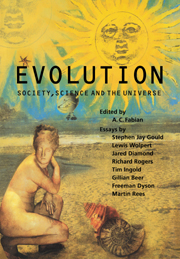Book contents
- Frontmatter
- Contents
- Introduction
- 1 On Transmuting Boyle's Law to Darwin's Revolution
- 2 The Evolution of Cellular Development
- 3 The Evolution of Guns and Germs
- 4 The Evolution of London
- 5 The Evolution of Society
- 6 The Evolution of the Novel
- 7 The Evolution of Science
- 8 The Evolution of the Universe
- Notes on Contributors
- Acknowledgements
- Index
4 - The Evolution of London
Published online by Cambridge University Press: 25 January 2010
- Frontmatter
- Contents
- Introduction
- 1 On Transmuting Boyle's Law to Darwin's Revolution
- 2 The Evolution of Cellular Development
- 3 The Evolution of Guns and Germs
- 4 The Evolution of London
- 5 The Evolution of Society
- 6 The Evolution of the Novel
- 7 The Evolution of Science
- 8 The Evolution of the Universe
- Notes on Contributors
- Acknowledgements
- Index
Summary
If evolution is the process of cumulative change then cities can be characterized as metabolisms that adapt over time in order to survive. In this chapter I argue that London, like other complex urban systems, is a fragile and delicate structure that has come full circle in the cycle of evolutionary change. The city is now facing an environmental, social and political crisis that threatens its very existence. Its future cannot be left to processes of random mutation, where market forces determine the policies and shape of its physical fabric. Intelligent forward planning, anticipatory design and government intervention are necessary to avoid the process of gradual decline and eventual extinction that has affected urban cultures in the past.
As the magnitude of the global environmental crisis comes to light, the design and management of our cities (the major consumers of world energy and producers of pollution) are becoming more critical to the survival of the planet. The solution lies in cities such as London becoming sustainable – circular metabolisms that conserve resources, use renewable energies and recycle waste, providing an equitable and stable social environment for future generations.
Sustainable growth
London is not alone in the struggle for urban survival. Human life has always depended on three variables: population, resources and environment. Today, we are the first generation of human inhabitants of the planet to face and be aware of the simultaneous impact of expanding populations, depletion of resources and erosion of the environment. All this is common knowledge, and yet, industrial expansion and urban growth carries on regardless.
- Type
- Chapter
- Information
- EvolutionSociety, Science and the Universe, pp. 64 - 78Publisher: Cambridge University PressPrint publication year: 1998



